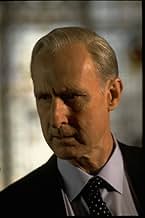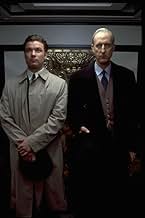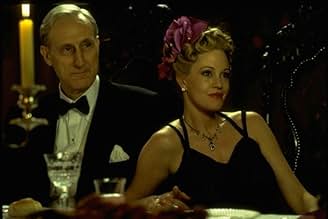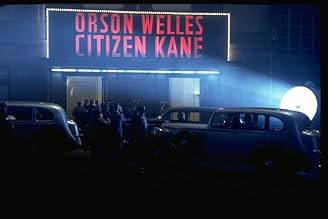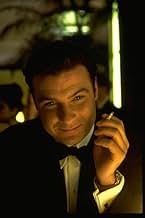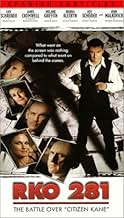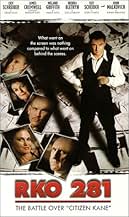AVALIAÇÃO DA IMDb
7,0/10
6,6 mil
SUA AVALIAÇÃO
Adicionar um enredo no seu idiomaOrson Welles produces his greatest film, Cidadão Kane (1941), despite the opposition of the film's de facto subject, William Randolph Hearst.Orson Welles produces his greatest film, Cidadão Kane (1941), despite the opposition of the film's de facto subject, William Randolph Hearst.Orson Welles produces his greatest film, Cidadão Kane (1941), despite the opposition of the film's de facto subject, William Randolph Hearst.
- Ganhou 3 Primetime Emmys
- 15 vitórias e 28 indicações no total
- Direção
- Roteiristas
- Elenco e equipe completos
- Produção, bilheteria e muito mais no IMDbPro
Enredo
Você sabia?
- CuriosidadesThe film shows RKO production chief George Schaefer announcing to Orson Welles and Herman J. Mankiewicz that he has lost his job on the very day of the opening of Cidadão Kane (1941) in May 1941. In fact, Schaefer did not get fired until late in the following year, and this was less because he had promoted the film career of Orson Welles than because almost all the films RKO had made during his tenure had been flops.
- Erros de gravaçãoIn 1940, Disney was not the major studio it was today. It had few major releases by that date, all animated and all of which were released through other distributors. The meeting of studio chiefs depicted in the movie probably did not take place- certainly not in the form shown- but even if it had, Walt Disney would probably not have been invited. (Samuel Goldwyn, also shown as present, had sold his share in MGM to Louis Mayer years earlier, but was still a major producer.)
- Citações
Orson Welles: I expected better of you, Mank.
Herman Mankiewicz: Me too, but I got used to it.
- Cenas durante ou pós-créditosEpilogue: "Citizen Kane was released in 1941 to critical acclaim and box office indifference. William Randolph Hearst gradually withdrew from public life. Marion Davies continued to live with him as his mistress. Until his death in 1951, Hearst never permitted a single advertisement or review of Citizen Kane in any of his newspapers. Orson Welles struggled yet succeeded in making films for the rest of his life, including The Magnificent Ambersons, Touch of Evil and Chimes at Midnight. He died in 1985. Citizen Kane is widely considered the greatest American film ever made."
- ConexõesFeatured in The 57th Annual Golden Globe Awards (2000)
- Trilhas sonorasI Can't Get Started
Written by Ira Gershwin and Vernon Duke
Performed by Bunny Berigan
Courtesy of The RCA Records Label of BMG Entertainment
Avaliação em destaque
Citizen Kane is arguably the best film ever made. And maybe the most controversial. Still what could and should have been a great story with a great cast and the powers of HBO behind it, is at best a routine docu-drama.
So much dramatic license is taken with the plot, it tends to border on being a fictional account rather than the real story.
While some of the incidents may be accurate(like Welles meeting Hearst in a hotel elevator on the night if Kane's premier) the dialogue in that scene never took place(Hearst admonishing Welles).
In addition, Welles never got the idea of doing Kane from his attendance at a Hearst party.
The writers tried unsuccessfully to place a direct parallel between the fall of Hearst and the rise of Kane. In truth Hearst still had plenty of power in 1941 when the film was released.
Liev Schrieber was OK as Welles, his sedate moments were more like Orson's, but he goes over the top in the more vocal moments.
John Malkovich was too insecure as Herman Mankiewicz, dependent on the bottle but still a brilliant writer. James Cromwell who never seems to give a bad performance, is the best of the cast with the perfect reserve as Hearst.
The biggest error was Marion Davies. The story tried to make her into a true Susan Alexander when in truth she had some acting ability and was never as insecure as Melanie Griffith portrayed her to be.
I love Citizen Kane and have read a lot about the film and the man who made it. Those responsible for this overrated film should have done so as well.
So much dramatic license is taken with the plot, it tends to border on being a fictional account rather than the real story.
While some of the incidents may be accurate(like Welles meeting Hearst in a hotel elevator on the night if Kane's premier) the dialogue in that scene never took place(Hearst admonishing Welles).
In addition, Welles never got the idea of doing Kane from his attendance at a Hearst party.
The writers tried unsuccessfully to place a direct parallel between the fall of Hearst and the rise of Kane. In truth Hearst still had plenty of power in 1941 when the film was released.
Liev Schrieber was OK as Welles, his sedate moments were more like Orson's, but he goes over the top in the more vocal moments.
John Malkovich was too insecure as Herman Mankiewicz, dependent on the bottle but still a brilliant writer. James Cromwell who never seems to give a bad performance, is the best of the cast with the perfect reserve as Hearst.
The biggest error was Marion Davies. The story tried to make her into a true Susan Alexander when in truth she had some acting ability and was never as insecure as Melanie Griffith portrayed her to be.
I love Citizen Kane and have read a lot about the film and the man who made it. Those responsible for this overrated film should have done so as well.
- JB-12
- 8 de mai. de 2000
- Link permanente
Principais escolhas
Faça login para avaliar e ver a lista de recomendações personalizadas
Detalhes
- Data de lançamento
- Países de origem
- Idioma
- Também conhecido como
- RKO 281: The Battle Over Citizen Kane
- Locações de filme
- St. Pancras Renaissance Hotel London, Euston Road, London, Greater London, Inglaterra, Reino Unido(staircase at Hearst Castle)
- Empresas de produção
- Consulte mais créditos da empresa na IMDbPro
Bilheteria
- Orçamento
- US$ 12.000.000 (estimativa)
- Tempo de duração1 hora 26 minutos
- Cor
- Mixagem de som
- Proporção
- 16:9
Contribua para esta página
Sugerir uma alteração ou adicionar conteúdo ausente



